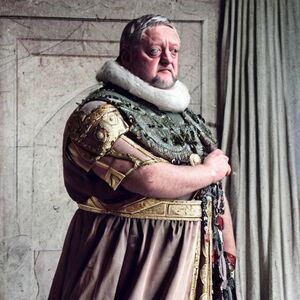Molossus
Molossus | |
|---|---|
 | |
| Born | February 18, 1958 Unknown |
| Died | September 25, 2016 (aged 58) |
| Nationality | Daxiaese |
| Citizenship | Daxiaese |
| Occupation |
|
| Years active | 1978 - 2014 |
Molossus was an acclaimed Daxiaese operatic tenor and theater actor who is renowned for introducing the Daxiaese public to opera and popularizing the genre with plays such as Gromeluta and Tyranno, were he played Engelfärt the Flatulent and the Caphirian Imperator Magasevetus, respectively. He was a prolific recorder of both entire operas and single arias, releasing some twenty opera albums during his opera career. In 1997 he was awarded the Meritorious Golden Crane medal by the government for his extensive work in the musical arts.
Born in obscurity and of uncertain parentage, Molossus was raised by nuns in a church and named after a breed of dog from Sarpedon. Notable for his cyclopean size (he stood at 2.6 meters), bloated appearance and bulging eyes; Molossus was born with a form of gigantism. His booming tenor voice was in large part thanks to his barrel sized chest and in his later years he suffered from morbid obesity, gout, diabetes and the odd extra vestigial limb. He died during a vacation in Trossera from heart complications. Molossus was a devoted lifelong member of the Democratic Christian Church of Daxia and the East and left all his of estate to it.
Early life and training
Molossus was abandoned in front of a church as a child of mere days, hence his exact birthdate is at best guesswork. According to the nuns who briefly spoke with the woman who left him there, she spoke a form of vulgar Caphiric, hence the suspicion she might have been a runaway slave from Caphiria's embassy. An ugly, misshapen fleshy lump of a child by all accounts, Molossus would grow prodigiously in a few short years, becoming a sort of workhorse for the church. Possibly suffering from a degree of mental retardation, he nonetheless was allowed to become a choirboy by the nuns and they would spend hours helping him memorize religious songs. Recognizing his powerful voice as something worthy of being developed, the nuns raised money to hire a teacher to give vocal training to Molossus.
Realizing the potential of their oversized ward, the church began presenting Molossus at singing festivals where his size, strange appearance and powerful voice began drawing great crowds to see him. At one of these festivals he and his handlers were approached by an opera singer from Ovetta who offered to train him, an offer which was accepted. During his studies he continued living with the church, working many hours of physical, back breaking labor. After long and arduous effort, Molossus successfully learned how to read music.
Career

By 1979 at the age of 21 he was considered a professional opera singer and rising star of the genre in Daxia. In 1980 he performed his first rendition of Imperator Magasevetus at the Liyuan Theater, his large, monstruous appearance considered to be a perfect physical reflection of Magasevetus's dark international reputation. His performance was so critically acclaimed that he was invited to perform at the much grander Leng State Opera before two thousand people. Commentators reviewed his performances favorably noting that he sang sweetly and appealingly, and his voice was robust, of a pure tone and arresting qualities, unforced in strength and range.
Its believed that during this period, Molossus became addicted to the painkillers he took for his gout and that his handlers from the church were complicit in his addiction, as it made it much easier to handle and coax him when sedated. As he aged and his health issues worsened, Molossus developed a terribly volatile temper, breaking doors and furniture, picking up people and swinging them around, pounding walls with ham sized fists if he wasn't served his favorite Moloko milk brand or if his costumes were improperly ironed and stored.
In 1991 there was an incident in the home of Molossus where one of his handlers was apparently murdered by apparently being flung against a wall with great force, which resulted in his spinal cord being shattered. An investigation into the matter ruled the death was accidental and the case was buried. Rumors abound that the victim had in fact molested Molossus in his childhood and Molossus killed him in a blind rage. This was not the first case that raised suspicions that Molossus was more of a prisoner of the church, used solely to generate it revenue. Molossus himself, perhaps too dimwitted to know better, never made any disparaging comment in public about his relation with the church.

Death
Having long suffered from terrible joint pain due to his obesity, in 2016 his church handlers decided that Molossus was to be taken to Aciria in hopes that the warmer weather would alleviate some of his ailments. By this time Molossus weighed 650 kilograms and was possibly one of the heaviest humans alive and was entirely unable to ride or even fit in a normal car. During his vacation Molossus moved around Trossera in a modified open top military truck provided by the Polizia Amministrativa Imperiale. On the night of September 25th he suffered a massive heart attack while trying to get up from his bed to urinate, destroying the bed frame as he crashed backwards into it and dying on the spot. The body was so large and unwieldy it proved impossible to maneuver the body out of the building so firemen had to be called to break open a hole in the wall with sledgehammers. His body was flown back to Mirzak on a military cargo plane and buried in the city's Christian cementery in a private ceremony. His will and testament, purportedly dictated by him to church officials in the presence of a notary, left all of his earnings, properties, various costumes and rights to his discography to the church itself.
Legacy
Molossus was a unique character not only in Daxia but on the world stage. That a man with his obviously diminished mental faculties and physical abnormalities was able to sing so powerfully and capture the minds of his audience was nothing short of extraordinary. The novelty of a giant man of foreign blood singing opera has not died out and there are no reported instances of the xenophobic Daxian audiences ever heckling him. The enduring popularity of opera in Daxia owes much to the works of Molossus. On the other hand the secretive and unexplained nature of his relation with the church that took him in and educated him, but also may have used and abused him for its own gain leaves moral and legal questions unanswered.